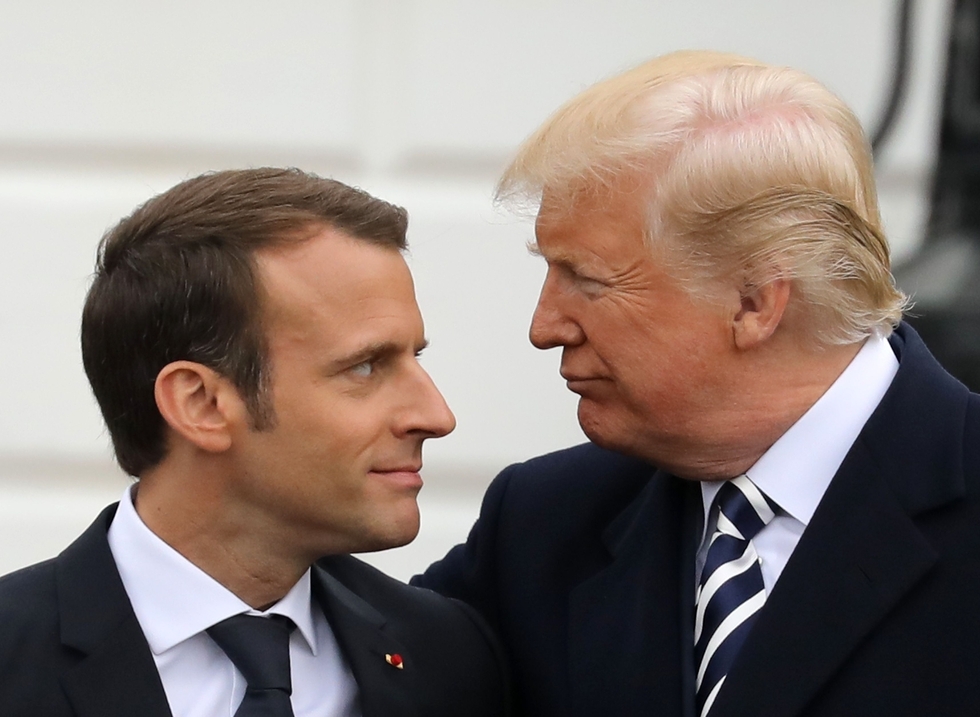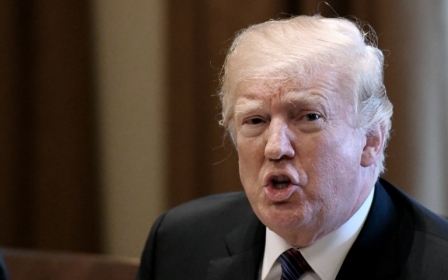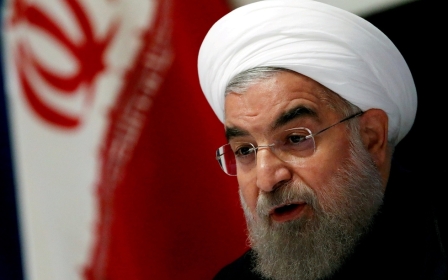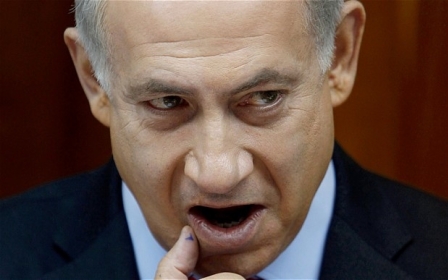Iran nuclear deal: What happens if Donald Trump kills agreement?

Iran will seek constructive relations with the world despite possible sanctions, President Hassan Rouhani said on Tuesday, hours before US President Donald Trump is expected to ignore international pressure and scrap the landmark arms control deal.
Merely an hour before Trump's announcement, the Associated Press news agency was quoting sources as saying that Trump would be pulling the United States out of the nuclear deal.
The announcement will come despite a last-ditch attempt by British Foreign Secretary Boris Johnson to save the Joint Comprehensive Plan of Action, which restricts Tehran's nuclear ambitions.
Johnson travelled to Washington on Monday and used an appearance on Fox and Friends, the president’s favourite TV show, to urge him not “to throw the baby out with the bathwater.”
Trump has repeatedly threatened to withdraw from the 2015 deal, which lifted economic sanctions on Iran in exchange for Tehran limiting its nuclear ambitions, unless fellow signatories - the UK, France, China, Russia and Germany - fixed what the president called its shortcomings.
On Tuesday Russia warned of the consequences of the United States pulling out from the deal, reported Reuters. There would be "inevitable harmful consequences to any actions towards breaking these agreements," Kremlin spokesman Dmitry Peskov told reporters.
'Iran will stand on its own feet'
Rouhani said in a speech broadcast live on state television that the foundation of Iran's foreign policy was constructive relations with the world.
“If we are under sanctions or not, we should stand on our own feet. This is very important for the development of our country,” Rouhani said in a meeting with oil managers in Tehran.
What are Trump's options?
- Refuse to sign waiver: Trump could refuse to sign a new 120-day waiver on US sanctions on Iran’s central bank and send a message to Congress that he wants lawmakers to restore them. But it would take at least 180 days before the toughest measures took effect. Is Trump that patient?
- Second set of sanctions: Trump could signal that he will not renew waivers for a second set of sanctions, up for renewal in July, that focus on more than 400 Iranian firms and businesspeople. An aggressive move would be to impose these immediately - or attach new conditions on either set of sanctions
- The so-called 'nuclear option': Trump re-imposes all sanctions at once and threatens secondary sanctions on states that deal with Iran. The US would be in breach of the nuclear deal, which says that sanctions must remain lifted so long as Tehran is complying with the deal: the IAEA says Tehran is doing this, as does Pompeo
Rouhani on Monday suggested that Iran’s line is shifting and that it may try and stick to the deal even if the US abandons the agreement, saying that Tehran could “continue to remain committed”.
“We are not worried about America’s cruel decisions. No change will occur in our lives next week. If we can get what we want from a deal without America, then Iran will continue to remain committed.”
However, Iran’s first vice president warned on Tuesday that only the “naive” would negotiate with the US suggesting other factions in Tehran are against on-going rapprochement with the West if Trump ditches the deal.
Eshaq Jahangiri, a popular reformist politician who has been suggested as a possible presidential contender in Iran's 2021 election, said: “Today, the biggest power in the world is yelling that it does not accept it, it's up to them what to do with the deal, but (from now on) naive individuals would accept to enter talks with such a country.”
Iran's access to the global financial and trading systems is likely to be restricted if Trump re-imposes sanctions or threatens secondary sanctions on countries that make deals with Iran.
Tehran has been bullish about its economic outlook, saying its oil industry would continue to develop even if the United States re-imposed sanctions on Tehran.
On Tuesday the head of country’s central bank said Iran’s economy would not be affected if Trump took the US out of the nuclear deal. “We are prepared for all scenarios. If America pulls out of the deal, our economy will not be impacted,” Valiollah Seif said on state television.
But Seif's comments came as the Iranian rial was near record lows against the dollar on Tuesday as Iranian tried to buy hard currency, fearing financial uncertainty ahead if Trump quits the deal.
Sanctions imposed on Iran in early 2012 by the United States and European Union over its nuclear programme cut Iran's crude exports from a peak of 2.5 million barrels per day before the sanctions to a little more than one million barrels.
Iran's economy is 60 percent reliant on oil income and it re-emerged as a major oil exporter in January 2016 when international sanctions were suspended. Any move from Trump could disrupt the global oil supply.
Johnson's charm offensive backfires
The comments from Tehran came as Johnson mounted a last-ditch attempt to influence Trump and save the nuclear deal. Appearing on Fox and Friends, he said: “What if the Iranians do rush for a nuclear weapon? Are we seriously saying we are going to bomb [Iran’s underground nuclear enrichment] facilities at Fordo and Natanz?”
Johnson appeared to direct his comments directly at the US leader, telling the show in his final words that “the president is right”. In another interview, Johnson even suggested that Trump should win a Nobel peace prize if he is able to fix the flaws in the Iran deal, which was struck by Barack Obama in 2015.
Johnson met with Mike Pence, the US vice-president, and Mike Pompeo, the US secretary of state, during a day of talks in Washington on Monday. But diplomatic sources have said that the UK now expects Trump to withdraw from the deal, with White House press secretary Sarah Sanders pouring scorn on the idea that the deal will be saved. Speaking a few hours after Johnson’s comments she again described the Iran deal “as one of the worst deals ever made”.
Emily Thornberry, Labour’s shadow foreign secretary, told BBC Radio 4’s Today programme on Tuesday that Johnson’s actions in Washington showed that British influence is in decline, and that Johnson’s attempts to woo Trump had backfired.
Meanwhile, French President Emmanuel Macron spoke by telephone with Trump on Tuesday, according to AFP. While a terse statement from the Elysee Palace said only that the two leaders "discussed matters relating to peace and stability in the Middle East", with no specific mention of Iran, Macron has positioned himself as the emissary for European officials seeking a compromise that would keep the deal intact.
Both Macron and German leader Angela Merkel have made repeated personal pleas to Trump in face-to-face meetings in Washington during the past fortnight.
British, German, French and senior EU officials met Iran's deputy foreign minister Abbas Araghchi in Brussels on Tuesday and "used this opportunity to reiterate their support to the continued full and effective implementation of the (deal) by all sides", the bloc said in a statement.
France is likely to push for a wider deal, “whether the United States participates or not”, the country's defence minister said on Tuesday.
“This agreement is not the best one in the world,” Florence Parly told RTL radio. “But without being perfect, it still has its virtues … and they [the Iranians] are respecting it,” she said.
The US stands alone
Trump has repeatedly attacked the deal signed by his predecessor as “insane”, and called for new controls to block Iran’s ballistic missile development, curb its long-term nuclear ambitions and to halt its support for militant groups in Syria and Yemen.
Tonight’s announcement will be a test for European and Chinese diplomacy and the ability of world leaders to influence Trump, but any move by the US will be weakened by its lack of allies, experts say.
“What waters down the longer term impact of potential US withdrawal from the deal is that the EU has less inclination to join America now compared with a few years ago," said Hasnain Malik, Dubai-based head of equity research at Exotix Capital.
"Russia has increased its influence in the Middle East, both on the Iranian and Saudi sides, and China is more advanced in its foreign ambitions.
“By acting unilaterally, the US might significantly dilute its impact. We would not place a high probability on regime change in Iran nor on Iran being willing to renegotiate much further in the event of a US unilateral withdrawal.”
Middle East Eye propose une couverture et une analyse indépendantes et incomparables du Moyen-Orient, de l’Afrique du Nord et d’autres régions du monde. Pour en savoir plus sur la reprise de ce contenu et les frais qui s’appliquent, veuillez remplir ce formulaire [en anglais]. Pour en savoir plus sur MEE, cliquez ici [en anglais].





